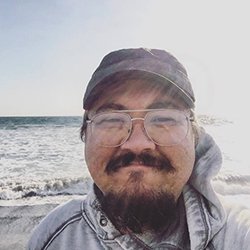by Walter Cummins
When the hospice nurse came down into the living room to tell Mason that Virginia had died, his first thought was to call Lila and ask her to clean. Even as he followed the nurse back up the steps to the guest room, he wondered why of all things that notion came into his mind when he had to inform his children, some friends, and then the funeral home. He hardly knew Lila, rarely saw her during the ten years she had arrived once a week to scrub and polish for Virginia. She had been there the past Monday, sitting on the edge of Virginia’s bed, speaking softly. From the hallway, Mason, working at home, had watched Virginia gaunt and ashen, barely nodding. Then the nurse came, and Lila left without even dusting.
The nurse was a sturdy woman, hair cropped short, reading glasses dangling from a chain. At the doorway, she touched his arm, eyes soft with sympathy, but said nothing, just gestured toward the bed where she had pulled the covers up to Virginia’s chin. His wife’s mouth was open, jaw contorted as if she had made one last gasp for breath and froze in the midst of it. Had she wanted him to call Lila? Were those her last words, gasped to the nurse because he wasn’t there to hear? He shook his head, aware that he was being foolish.
Mason phoned the children, miles away, forewarned and awaiting his message. He called the two daughters and a son in the order of their ages, the way he always did in an attempt not to pick favorites. They had visited separately a month ago, spending time alone with their mother, saying their goodbyes, and Mason gave them privacy. But despite the doctor’s predictions Virginia had lingered, and Mason put off sharing his own farewell, wanting more time as he rehearsed the words in his head, not believing he would ever have to speak them.
This night the conversations with his children were brief, his gulp of hesitation and then, “She’s gone.” Soft sobs from both daughters despite the inevitable. He could feel them squeezing their phones, groping for words. He promised to give them details about the funeral tomorrow. “All right,” they told him, both of them speaking in the same tone of voice. It struck him how alike they had always sounded. His son asked the exact time his mother had died, and that struck Mason as odd. He hadn’t thought to look at his watch. The nurse would know. She was writing on forms in the next room, giving him privacy, but he could hear the tap of her pen.
While he waited for the undertakers, alone, the nurse gone to make another visit, he wondered if he really should call Lila, this stranger whose name had popped into his head. But she wasn’t a stranger to Virginia, who spoke of her often, recounting their weekly conversations, shaking her head at the endless series of miseries in Lila’s life. For all those years the day Lila was due to clean, his wife had left her work at the shop for an hour to unlock the door and talk over coffee before Lila began her chores.
“Do you consider her a friend?” he had asked Virginia once.
The question seemed to surprise her, “I never thought of it that way, but I suppose she is.”
The word “suppose” echoed in Mason’s memory as he opened a kitchen drawer and searched through Virginia’s address book, realizing he didn’t know Lila’s last name. But there was her number, under L, as if Virginia had not known either.

 Abhijit Sarmah is a Masters in English student at the University of Dibrugarh, Assam, in India. He wrote a chapbook, The Voice Under Silence, in 2016.
Abhijit Sarmah is a Masters in English student at the University of Dibrugarh, Assam, in India. He wrote a chapbook, The Voice Under Silence, in 2016.
